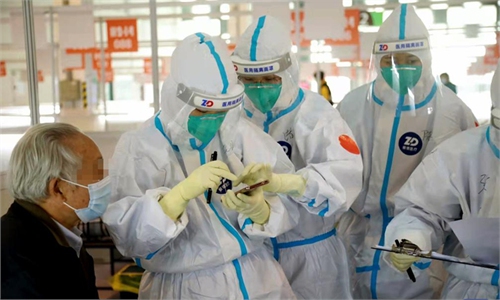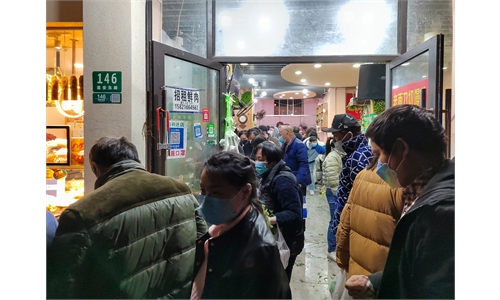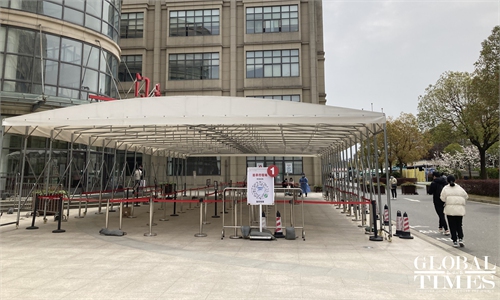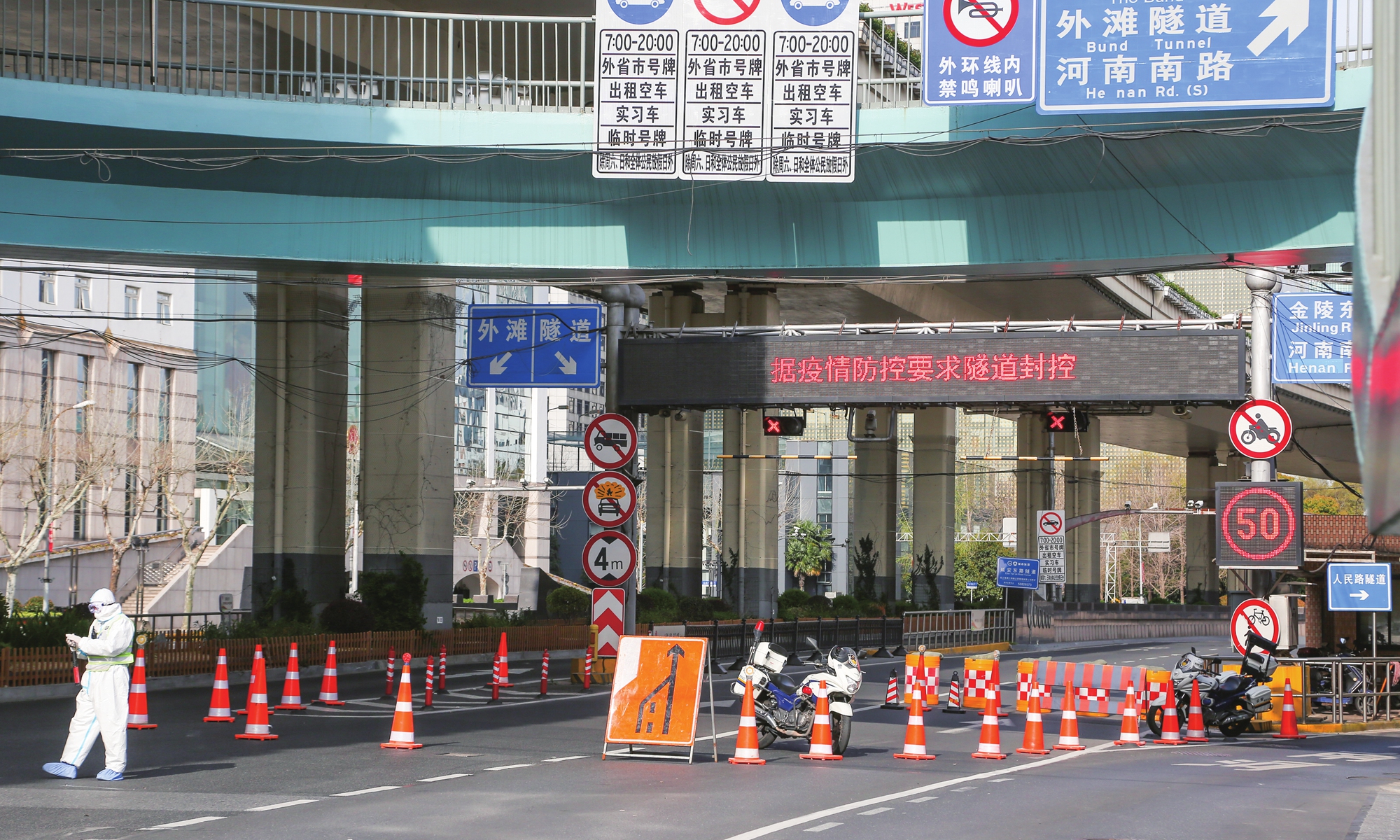
The tunnel connecting Pudong with Puxi is sealed off, with only a few cars with a pass allowed. Photo: Wu Chuanhua/Global Times
According to observations from epidemiologists, Shanghai's unique exploration of precisely handling COVID-19 involves "the most difficult path" as it aims to put a stop to viral transmissions while not letting the country's economic engine lose steam. However, Shanghai's sudden change of course is also a decision aimed at controlling the virus at minimal cost, said experts, believing that once the curve is flattened, Shanghai will continue to explore a way out, and its experience will be valuable for China as it searches for an exit to the pandemic.
Shanghai, which has been proud of its "precise management of COVID-19 controls", suddenly changed course from its previous piecemeal approach of "slicing and gridding" and veered toward a much stringent path on Sunday night, with authorities announcing they were splitting the city roughly into two parts along the Huangpu River for a total of nine days to allow for "staggered" testing. Moreover, to curb people's movements, the government suspended buses and taxis in targeted areas, and closed cross-river bridges and tunnels.
The decision was taken after the financial hub recorded a record 45 confirmed cases and 2,631 asymptomatic cases on Saturday. Shanghai on Sunday reported 3,450 asymptomatic cases, accounting for nearly 70 percent of the nationwide total, along with 50 confirmed cases.
Speaking at a press conference on Monday, Wu Fan, an expert from Shanghai's anti-epidemic leading expert team, admitted that the city faces a potential risk of large scale infections as it witnesses clustered infections and sporadic viral spreads. This means that more decisive and stringent measures are needed to screen virus carriers and to stamp out infection chains lurking within residential communities, said Wu.
The city closed all parks on Monday, and suspended off-line work permit services for foreigners.
Wu Jinglei, Director of Shanghai Health Commission, said at the same conference that Shanghai is gearing up to build isolation sites to house patients with mild symptoms. In addition to designated hospitals, Shanghai has put into use six back-up hospitals, and remodeled two sports stadiums, one residential building and a large scale exhibition center for isolation.
Shanghai officials also announced measures to guarantee people's needs for daily necessities, and the medical needs of non-COVID patients.
During the past two years, Shanghai residents' lives were not greatly disrupted as the city's meticulous antivirus measures had always managed to stamp out infections in their early stages. The newest strict COVID-19 measures in Shanghai have caught its residents "off guard."
"For the past month, my life and work were not interrupted too much as the city has adopted this grid management model. The biggest inconvenience is food supply," Li Cuihua, a Shanghai resident, told the Global Times. She said she immediately stocked up on daily necessities after the government announced the staged closed-off management on Sunday night.
"I was caught off guard by the sudden notice, but I understand the measures. Hopefully the strict measures can bring freedom to all of us soon," Li noted.
Social media was also flooded with jokes about Shanghai's newest measures. A rap titled "buy vegetables first and do nucleic test later" in the Shanghai dialect trended on Shanghai residents' WeChat, an instant messaging app. "You raised up Shanghai, you have to believe in Shanghai; if Shanghai fumbles, where else can succeed?" said the lyrics.
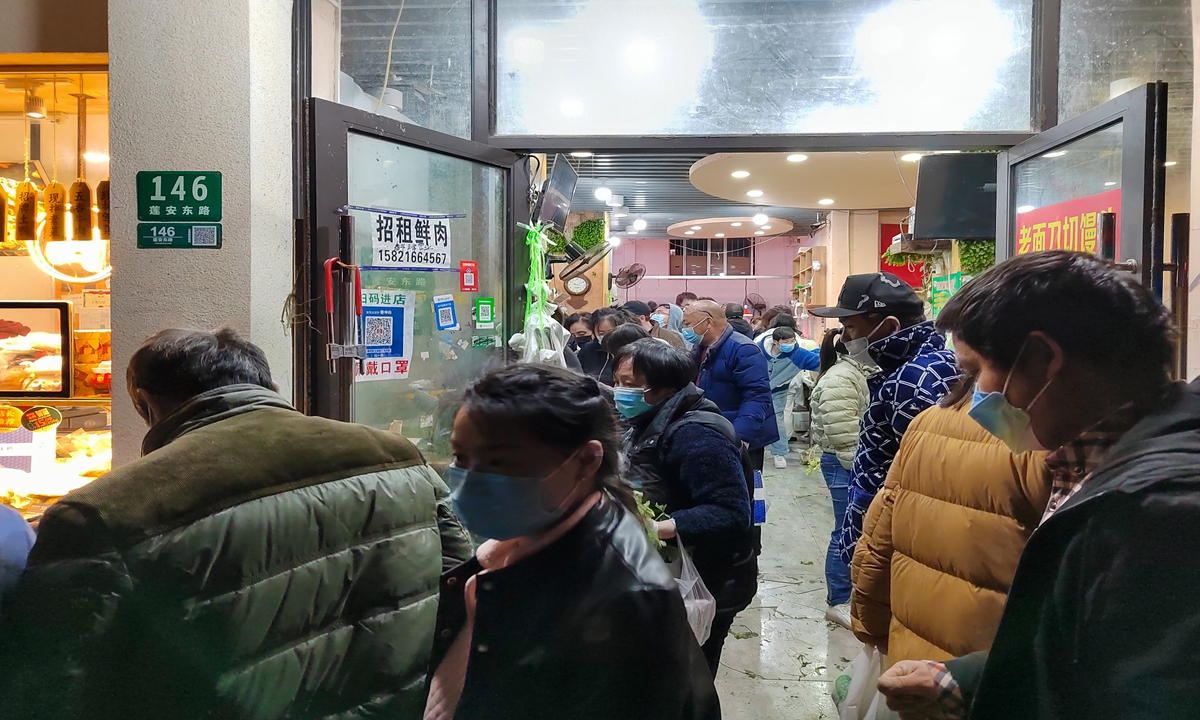
Shanghai residents line up to purchase daily commodities in Pudong on Sunday night, which will be put under closed-loop management from Monday to Friday. Photo: VCG
A crucial decision
For Karen Li, an employee of a fund company in Shanghai, there was something more urgent to do before buying vegetables. Li, who lives in Puxi, received a call from her boss on Sunday night after the snap government notice, so she packed her clothes and went back to her office in Pudong, the city's sprawling eastern half, and prepared to live in her office for the next few days.
"The stock market won't stop opening just because of the virus," said Li.
The Shanghai Stock Exchange remains in operation, and announced Sunday night that stock issuance applications and other paperwork can be done online, with deadlines relaxed as needed.
Shanghai, China's finance and international business hub, and also home to the world's largest container-shipping port, has been shunning citywide lockdowns, as Wu Fan said Saturday, "not only is it a city of its own residents, but also a city with a very important role in China's economy and social development, which has even an impact on the global economy."
Wu Jinglei said on Monday that the city's airports, train stations and ports are still open.
Zheng Jingwen, a research fellow with the Shanghai International Shipping Institute, said that the Shanghai port is still in operation, though efficiency has been reduced due to labor shortages and quarantine requirements. "The level of congestion is quite serious," Zheng told the Global Times on Monday.
Meanwhile, Tesla suspended production Monday, with operations to be halted for four days, according to media reports. Tesla told the Global Times on Monday that it is strictly implementing the epidemic prevention and control measures and will arrange working schedules according to the government's policies.
"We believe that Shanghai's speed and strength and today's move against the epidemic lay a foundation for better and faster development," Tesla said in a statement sent to the Global Times on Monday.
This new COVID-19 wave in Shanghai could cut the city's GDP growth by 0.5 percent in the first and second quarters compared to a year ago, Cao Heping, an economist at Peking University, told the Global Times on Monday, brushing off the possibility of national economic growth suffering from a major impact.
He noted that the epidemic will put liquidity pressure on the city's secondary industry and have a limited impact on the services industry. "Many companies in the services industries have become used to the online model and will find a way out with the experience gained over the past two years," Cao said.
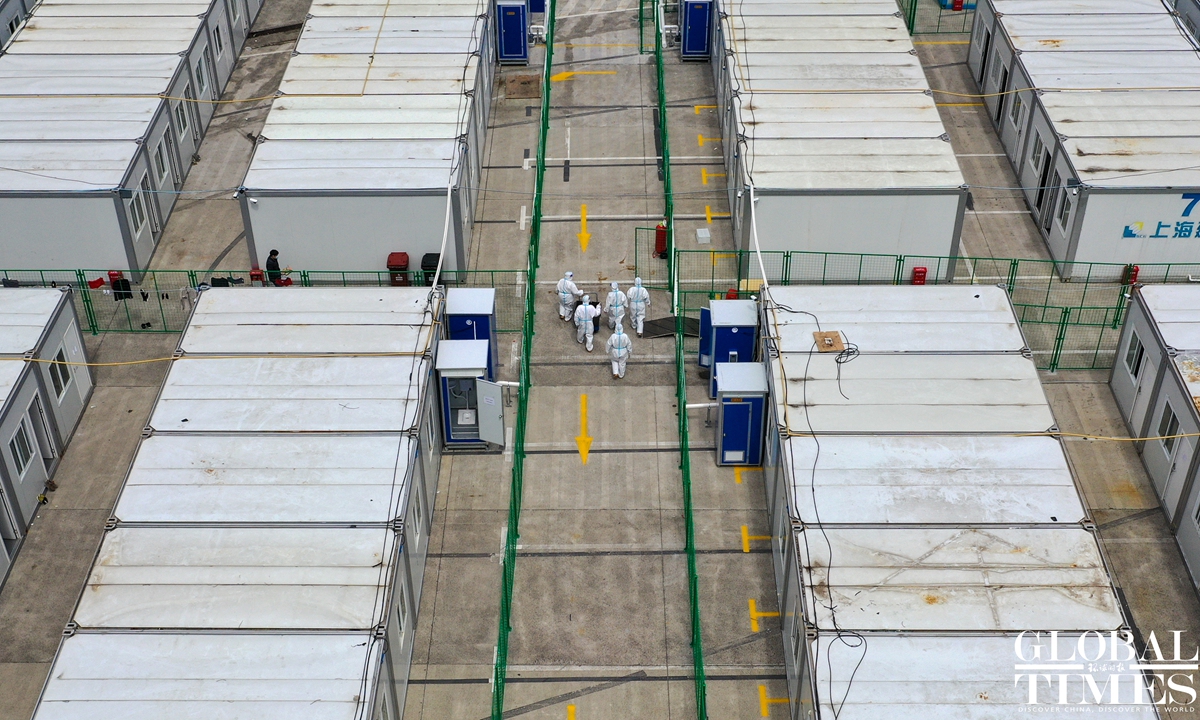
Take a look at the centralized isolation venue at the Pudong Expo Area in Shanghai.Photo: Hu Gong
Most difficult path
Because of the city's special status as a financial hub, experts believe Shanghai has taken "the most difficult path" in handling COVID-19, as it avoided the laissez-faire approach taken by many Western countries, and steered clear of a one-size-fits-all measure, or large-scale methods taken by some places in China, to keep the economy growing.
"Shanghai was supported by the country's best medical system and city management model to support its exploration of a path to a more precise way of handling COVID-19," Zhuang Shilihe, a renowned immunologist, told the Global Times, noting that the exploration has met with some obstacles recently, such as online complaints of difficulties in getting food, while a nurse died after an asthma attack last week after delayed treatment.
With cases propagating so quickly and the threat of a highly contagious Omicron variant mounting, "Shanghai is adopting such strict measures to get a clear picture of the whole situation," Chen Xi, an associated professor of public health at Yale University, told the Global Times, noting that this approach aims to stamp out viral infections within a short time. "Once the infection spreads and exceeds Shanghai's ability to handle it, there will be big losses."
Chen believed that once the infection curve is flattened this time, Shanghai will revert to its previous precise management model, as this is the strategy that best suits the financial hub.
Zhang Wenhong, who heads Shanghai's expert panel on COVID-19, wrote on his Sina Weibo last week that Shanghai will not adopt a one-size-fits-all approach to handle this outbreak, and will minimize the impact of antivirus measures on people's daily lives. "This is going to be very difficult, and won't go smoothly," said Zhang.
Zhuang said it is too early to say whether Shanghai's change of course represents a "failure" of previous approaches. "Succeed or fail, the experience will be valuable for this country," said Zhuang.
All antivirus measures come at a price - the difference is what the price is, he noted.


